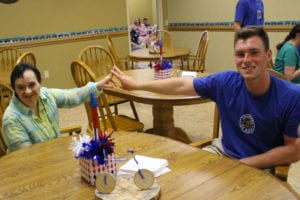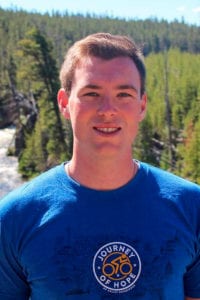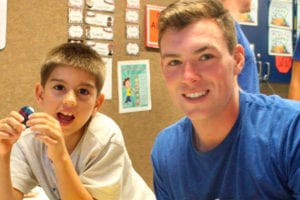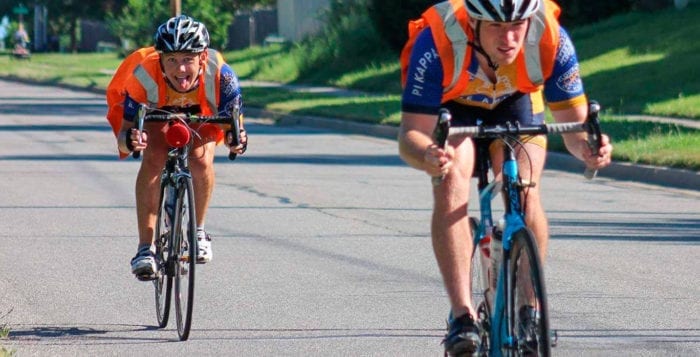By Kevin Redding
Cody Carey wanted to do something a little more adventurous this summer than work double shifts at a local restaurant. So the Miller Place-bred junior accounting major at Ohio State University decided to strap on a helmet, hop on a blue Giant Defy road bike and push himself further than he ever thought possible.
Joined by 29 other members of the Pi Kappa Phi fraternity from all over the country, Carey, 21, is currently on a 67-day, 4,000-mile bike ride from Seattle, Washington, ending Aug. 12 in Washington, D.C., with scheduled stops along the way to spend time with people of all ages dealing with disabilities through dinners, dances and games.

The Journey of Hope is an annual fundraising bike excursion hosted by the fraternity’s national philanthropy, The Ability Experience, since 1987 that raises funds and awareness for people with physical and mental disabilities — ranging quadriplegia to Down syndrome to autism.
“It’s incredible to see, especially with everything in the news about students today and this next generation,” The Ability Experience Chief Executive Officer Basil Lyberg said. “It’s very encouraging to understand the power that young people have to impact their communities and that they’re not just talking the talk, they’re out walking it. And in our case, riding across the country.”
Split among three teams of cyclists, each team takes on a different route that ultimately converges in D.C. Individual riders are required to raise $5,500 to contribute to an overall goal of $650,000, and Carey, the only Ohio State student on the ride this year, has already raised $5,799 through an online campaign.
He said members of the fraternity, which spans colleges and universities across the country, are encouraged to participate in the ambitious experience and he knew it was something he would regret not doing.
“I wanted to take myself out of my comfort zone and do something that’s essentially life-changing and that I’ll never forget,” Carey said. “This experience has definitely made helping people even more of a strong value of mine. Everybody should help anybody they can on a daily basis.”

Since embarking June 6 on the Journey of Hope’s TransAmerica route, Carey and his fellow cyclists have pedaled through seven states, including Idaho, Montana, Wyoming and Colorado, hitting the road each day at 6 a.m. and wrapping up in the early afternoon. The riders generally sleep on gym floors and YMCA’s within the towns they visit, and travel an average of 75 miles per day. During a 12-hour bike rides, the athletes aren’t allowed to listen to music for safety reasons. Carey laughed about the long rides, and admitted there are parts of home he misses.
“How much I miss my bed,” he said. “There’s lot of chatting with the others, lots of silence, and lots of wind.”
He has ridden through sprawling peaks and snow-capped mountains in Montana, crossed over valleys in Jackson Hole, Wyoming, past cornfields in Kansas and said he has loved “taking in the big, beautiful country on two wheels.”
But for Carey, nothing compares to the experience of meeting locals from each state during the ride’s friendship visits. After a morning of pedaling, cyclists visit local groups supporting people with disabilities and take part in a long list of activities, from drawing with kids to playing wheelchair basketball and kickball to having lengthy conversations with teens and adults who face challenges every day.
“It’s been extremely heartwarming,” he said of the visits. “Many of the organizations say it’s like Christmas when we come by. We just make sure the adults and kids are having a great time. You don’t realize everything you have until realizing it can be taken away like with the people we’ve met that have suffered injuries, and with those who are disabled their whole life.”
Referring to the impact it has had on his fellow cyclists, he said, “I’ve never seen a group of guys cry as much as I do now.”
He recalled a special moment in Casper, Wyoming, when a man who recently suffered a brain tumor relayed a resonating message.

“We were all about to get up and go play some games over in a park when he stood up and sat us all back down to tell us not to stress over the little things in life,” Carey said. “Because, he said, you can wake up one day and have something like what he experienced happen to you and your whole life could change. He told us to enjoy every second we have as we are, which was really touching coming from a guy now considered disabled. It kind of just pointed out all the stupid things we stress about in our regular lives.”
Preparation for the journey consisted of getting on a bike just a week and a half before heading to Seattle, Carey admitted, but being an athlete during his days in Miller Place provided him with much-needed mental stamina. He played soccer, which he competed in at a national level, and lacrosse, too.
“I’m so excited for him, he’s always been in terrific shape and he probably has thighs the size of tree trunks now,”Carey’s mother Elizabeth Hine joked. “I’m proud as heck of him. Between seeing the country and all the people, he says this is the best summer he’s ever had.”
Just two days into the cross-country ride, Carey said the group logged 125 miles over 24 hours while passing through Mount Rainier National Park in Washington state.
“Everyone on that route, except one person who suffered hypothermia, finished, and at the end of it we all looked at each other and said, ‘That’s the hardest thing we’ve ever done in our lives,’” Carey said. “We all say that our bike is our disability and we have to overcome it each day.”





